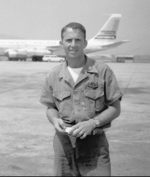
Bud Willis
Captain, Marine Observation Squadron 2 (VMO-2)
February 1966-March 1967
In the early 1950s, some older kids in my neighborhood convinced me that it would be okay to lie about my age in order to join their Boy Scout troop. At the very first meeting, I held up three fingers on my right hand and recited the scout oath to earn a Tenderfoot Badge: “On my honor I will do my best, to do my duty, to God and my country.” It all made perfect sense to this 10-year-old Tennessean. As far as I was concerned, I was born to be a scout—loyal, brave and trustworthy. Never mind that I had lied about my age to be in the club.
Later, at Tennessee Tech, while memorizing King Henry V’s inspirational speech to his soldiers on the eve of his battle with the French at Agincourt, a group of my peers came into my dorm room to convince me to join the Marine Corps and become an officer. King Henry’s words stirred in my head: “We few, we happy few, we band of brothers; for he today who sheds his blood with me will be my brother.” That summer, I was on a train to Quantico for officer training. Those selected for aviation went to Pensacola for flight school after graduation.
By the time I received my wings of gold in 1964, President Lyndon Johnson had shifted the war into high gear, and my Marine flight buddies and I were being trained for combat in Vietnam—flying the world’s first turbine-powered helicopter.
In February 1966, I was ordered to VMO-2, based at Marble Mountain on the South China Sea. Everybody knew to the day when they would be going home.
I buckled up for my first combat mission on March 1. During a routine perimeter check, several armed Viet Cong were spotted in a nearby village and we were given clearance to fire on them. I don’t think we hit anyone, but my first live rounds fired at human beings made me sick to my stomach. I laid in my hootch that night, staring into the blackness of my strange new world, and knew I had to figure out a way to survive 13 months of this.
I flew 640 more missions in the I Corps area with that Huey squadron. Most were medevacs, but I also flew gunship support for the personal Huey of our commanding general, Lewis Walt, and one time I flew with Robert McNamara when he visited.
 In November we added a god-forsaken place near the Laotian border to our seven-day rotation, Khe Sanh. I was asked to take two gunships and report to a Green Beret unit for what was described as a “deep recon insertion.” So deep, in fact, they painted over all identification on our aircraft, and removed all maintenance logs and serial numbers. We were told to take the names off our flight suits, empty our pockets and remove our dog tags.
In November we added a god-forsaken place near the Laotian border to our seven-day rotation, Khe Sanh. I was asked to take two gunships and report to a Green Beret unit for what was described as a “deep recon insertion.” So deep, in fact, they painted over all identification on our aircraft, and removed all maintenance logs and serial numbers. We were told to take the names off our flight suits, empty our pockets and remove our dog tags.
They sent us to a Special Forces camp at Lang Vei, two miles west of Khe Sanh, where we were directed to an underground command center the size of a small basketball court. It was alive with radios stacked three or four components high, all zapping and buzzing. A burly Green Beret major was in charge, barking out acronyms I had never heard before.
Our mission was to provide Huey gunship escort to two CH-46s that would drop three young Special Forces officers and a hatchet force of 35 assorted mercenaries near the Ho Chi Minh Trail for a delicate “snatch and grab” operation to capture the enemy for interrogation. We were told that under no circumstances were we to leave any American, dead or alive, in that area.
We executed the assignment just before dark at a landing zone between two large mountains, about two miles from Ho Chi Minh’s highway. We returned to Lang Vei. Around 9 p.m., we learned that the troops had come under attack, and that one of the officers had been killed along with several mercenaries. The survivors were making their way to a prearranged pick-up area, and the major, who was now belligerent because they did not have their dead comrade with them, told us to stand by to launch at any moment.
All night, we heard massive explosions and saw flashes coming from the LZ. We were called back to the bunker just before dawn, but the major was now curiously calm. Overnight, he had called in an all-out B-52 assault on the LZ—a “home run.” At dawn, we escorted a 46 to pick up the remainder of the troops and the two Green Berets, who had humped at an incredible speed to the pickup point. Enroute, we saw the LZ. The two mountains we’d seen earlier were gone—flattened like a parking lot, obliterating any evidence of our presence.
We flew back to Lang Vei and were told to go home. With the pressure off, we joked about going anywhere we wanted now because we had no identity. Reality set in quickly, however, and we just wanted to return to Marble Mountain to resume our poker game and sleep on our own cots.
On our flight back, as we listened to Armed Forces Radio, Johnny Rivers’ Secret Agent Man blasted: “They’ve given you a number, and taken away your name.”
Bud Willis’ recently published Marble Mountain is drawn from the journal he kept while in Vietnam.
Published in the February 2012 issue of Vietnam magazine.




